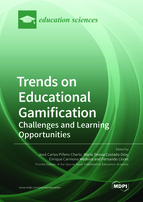Trends on Educational Gamification: Challenges and Learning Opportunities
A special issue of Education Sciences (ISSN 2227-7102).
Deadline for manuscript submissions: closed (1 January 2022) | Viewed by 57929
Special Issue Editors
Interests: mathematics teaching and learning; gamification; education & educational research; education assessment and evaluation; blended learning; teacher education; problem-based-learning; game-based-learning; mathematics teachers; mathematics instruction
Special Issues, Collections and Topics in MDPI journals
Interests: mathematics teaching and learning; mathematics teachers; mathematics instruction; teacher education; educational research
Interests: professional development; mathematics education; teacher education; teaching and learning; game-based-learning; problem-based-learning
Special Issue Information
Dear Colleagues,
Games are a natural activity—we all know how to play. Perhaps this is the key feature that explains the increase in the use of game-based learning (GBL) strategies: Applying games to education converts education into a universal activity.
Over the last ten years, the way in which education and training is delivered has considerably changed not only due to a new technologic environment—plenty of social networks, MOOCs, etc.—but also because of the appearance of new methodologies. Such new methodologies are shifting the center of gravity: from the teacher to the student, with the aim of awakening relational aspects, as well as promoting imagination and divergent thinking. One new approach that holds a considerable promise for helping to engage learners is, indeed, game-based learning (GBL).
However, while a growing number of institutions are beginning to see the validity of GBL, there are still many challenges to overcome before this type of learning can become widespread. Among these challenges, we find: (i) combining engaging game design with learning objectives and curriculum; (ii) evidencing learning outcomes; (iii) creating a gaming atmosphere that is adapted to all learners’ ability; (iv) the specific knowledge required for a proper game design; (v) the cultural barriers with faculty and costs associated with developing a learning game.
In this Special Issue, we want to gather several studies and experiences in GBL to be shared with other teachers and researchers. The topics of this Special Issue will relate to the use of game-based learning strategies at all academic levels:
- Learning and instructional theory for game-based learning;
- Future of game-based learning;
- Social and collaborative aspects of game-based learning;
- Assessment in game-based learning;
- Case studies and best practices in the use of game-based learning;
- Evidences of learning processes in game-based experiences.
REFERENCES:
The special issue should supplement the existing literature.
- Chamoso, J.; Durán, M.J.; García, J.; Martínez, J.; Rodríguez-Sánchez, M. Análisis y experimentación de juegos como instrumentos para enseñar matemáticas. Suma 2004, 47, 47–58
- Connolly, T.M.; Boyle, E.A.; MacArthur, E.; Hainey, T.; Boyle, J.M. A systematic literature review of empirical evidence on computer games and serious games. Educ. 2012, 59, 661–686.
- de Freitas, S. Learning in Immersive Worlds: A Review of Game-Based Learning; Published Version Deposited in CURVE September 2013 Original; Joint Information Systems Committee: Bristol, UK, 2013
- Oprescu, F.; Jones, C.; Katsikitis, M. I PLAY AT WORK-ten principles for transforming work processes through gamification. Psychol. 2014, 5, 1–5
- Piñero Charlo, J. C.; Educational Escape Rooms as a Tool for Horizontal Mathematization: Learning Process Evidence. Education Sciences 2020, 10 (9), 213.
Dr. José Carlos Piñero Charlo
Dr. María Teresa Costado Dios
Dr. Enrique Carmona Medeiro
Dr. Fernando Lloret
Guest Editors
Manuscript Submission Information
Manuscripts should be submitted online at www.mdpi.com by registering and logging in to this website. Once you are registered, click here to go to the submission form. Manuscripts can be submitted until the deadline. All submissions that pass pre-check are peer-reviewed. Accepted papers will be published continuously in the journal (as soon as accepted) and will be listed together on the special issue website. Research articles, review articles as well as short communications are invited. For planned papers, a title and short abstract (about 100 words) can be sent to the Editorial Office for announcement on this website.
Submitted manuscripts should not have been published previously, nor be under consideration for publication elsewhere (except conference proceedings papers). All manuscripts are thoroughly refereed through a double-blind peer-review process. A guide for authors and other relevant information for submission of manuscripts is available on the Instructions for Authors page. Education Sciences is an international peer-reviewed open access monthly journal published by MDPI.
Please visit the Instructions for Authors page before submitting a manuscript. The Article Processing Charge (APC) for publication in this open access journal is 1800 CHF (Swiss Francs). Submitted papers should be well formatted and use good English. Authors may use MDPI's English editing service prior to publication or during author revisions.
Keywords
- game-based learning
- assessment
- collaborative learning
- teacher instruction
- learning outcomes
- motivation









